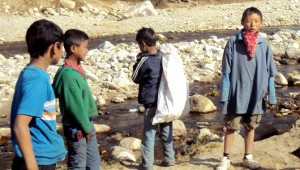When children abandon books to earn a living
Since the days of Victorian England where children were exploited as chimney sweeps, the world has become a more advanced place where child labor is no longer accepted.
In a country such as Bhutan, where small rural families depend on every family member contributing to the care and maintenance of agricultural holdings, child labor is perhaps seen as a natural part of life.
Milking the family cow, gathering seeds, doing household chores, child minding, collecting firewood, carrying water, picking fruit, herding and feeding the cows are responsibilities that children can take on to lessen the workload of their parents.
Children being able to work are considered positive development, and in fact leads to early accumulation of skills as well as contributing to family development. However, according to International Labor Organization standards, child labor is a ‘work situation’ when a child has to work to an extent that it severely affects his or her physical and mental health and moral abilities.
Though Bhutan is not a member of the International Labor Organization and has not ratified conventions on protection of children against child labor, it has ratified the South Asian Association for Regional Co-operation (SAARC) convention on regional arrangements for the promotion of child welfare in South Asia.
In the Bhutan Government’s Draft Labor and Employment Act, 2007, the Ministry of Labor and Human Resources has listed several sectors that are prohibited from employing children aged 13 to 17 as workers. However, within these prohibited sectors, there are certain areas where children are allowed to work, provided they are not exposed to harsh forms of labor.
For instance, children are prohibited from working in the mining and quarrying industry, although it is permissible for them to work as child minders, sweepers and cleaners in this industry. Likewise, in the prohibited sectors like construction, forestry, transport, confined space and heavy laboring and lifting, the children can work in domestic services, laundry and ironing and sewing; shoe repairing; car washing and minor auto repairing; food preparation, table services and waiting and dish servicing; and messenger service, clerical, filing and sorting respectively.
The Assistant Planning Officer with the National Commission for Women and Children (NCWC), Pema, spoke to Business Bhutan on the causes of child labor.
“Most child labor cases take place behinds the four walls,” she stated. “The main causes of child labor are poverty, under-privileged family and to get a supplement income.”
In the 2005 census, there were 12,166 cases of adolescents employed in agriculture; 1,805 in construction; 520 in hotel/restaurants and 315 in mining/quarrying.
The census data also showed the sectors in which adolescents (15-19) could be employed – namely, agriculture, mining/quarrying, manufacturing, electricity/gas/water, construction, hotel/restaurants, transport/communication, health services and education.
According to Bhutan Living Standards Survey 2003, at least one-quarter of children aged between 10–14 were working, most of them in rural areas, and that the proportion for girls is higher (22.3% of the sample population) than boys (15.9) and it also shows that the number of girls studying is less when compared to boys.
Unlike children willingly working to help their family in a rural area, when a young girl is sent away to work as a housemaid in an urban area, she loses the security of the family bond and is in greater danger of psychological trauma.
‘Project Hope’ is an initiative of the National Commission for Women and Children, where shelters are established and children who are seen as being at risk of being exploited as child labor, can be housed for 30 days until better living arrangements are organized for them.
Young children, who have had their childhoods taken away from them, and been forced to earn a living at an early age, now have a ray of hope at last, for a better life.
(From Business Bhutan, Issue 17)

